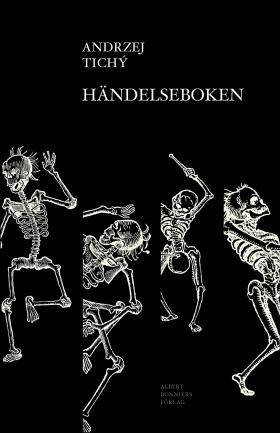
Händelseboken
(The Book of Events)
by Andrzej Tichý
reviewed by Margaret Dahlstrom
Andrzej Tichý is a Swedish writer of Polish and Czech background. His novels have won numerous prizes and awards. Händelseboken (The Book of Events) is his fifth novel, and has been short-listed for the Nordic Council Literature Prize 2025.
It is an unusual novel. It has no protagonist and no plot. Instead, there is a large cast of characters who are presented separately. The narrative moves between sections which focus on these recurring characters in a range of situations and timeframes. Between these passages are shorter segments on unrelated or tangential subjects, and frequent short quotes, attributed to historical or current public figures, or occasionally anonymous, unknown, or fictional people. This results in a very fragmented text, loosely held together by the recurring characters and themes.
In hardback format the novel has 500 pages, but many of these pages have only a line or two, or a single paragraph, so the reading time need not be particularly long. Even the longer sections, which seem like chapters, are not more than a few pages. On the other hand, it may stretch out for the conscientious reader, because there are many opportunities for tangents, looking up the background of a writer or musician referred to, or checking details of an historical event. On each of these diversions the reader may feel s/he is identifying the key to the narrative, but shortly afterwards, a new event undermines that interpretation.
The title ‘Book of Events’ might suggest an action-packed narrative, but the events vary in scale and nature. It is more a book of experiences, tracing incidents and situations in the lives of the various characters, and the effects they have. A recurring trope of death gives the narrative a dark feeling, although there are lighter moods at many points through the text.
One of the opening sections focuses on a writer named Zygmunt Pereira, who is smarting from a review of his latest book. Pereira considers a reply he could write, complaining that the reviewer has read carelessly and has missed the point. The critic describes Pereira’s work as fragmented, somber, and melancholy, all of which, the reader will find, apply to Tichý’s work, suggesting the possibility that the book we read is Pereira’s. This remains as a possibility: there is nothing in the text to confirm or refute it.
There is a strong self-referential tendency. An account of a woman whose job is selecting meaningful quotes for the pages of a desk diary mirrors Tichý’s text with its frequent short quotes positioned between the longer passages. One of these quotes is attributed to Pereira. There is an account of a one-year diary with an additional, unaccounted-for entry (366 days in a non-leap year) and this applies to one of Pereira’s works. There are references to a kaleidoscope and to a labyrinth, both of which could be seen as analogies for this text. More explicitly, two of the characters, in a discussion about music, elaborate on the experience of perceiving a whole work through fragments; one of them suggests it applies to everything in life and indeed to life itself. In view of all these elements of the text, there seems to be a strong case for considering the narrative as a whole to be a commentary on life: its variety, its fragmented quality, the randomness of events, and a frequent preoccupation with death. But there are likely to be almost as many interpretations of the novel as there are readers. This is a work which probably deserves several readings.

Händelseboken
Albert Bonniers, Stockholm, 2024, 670 pages
Foreign rights: Salomonsson Agency
Andrzej Tichý is the author of five novels. Eländet (Wretchedness) was published in Nicky Smalley’s English translation in 2020 and won the Oxford-Weidenfeld Translation Prize.
